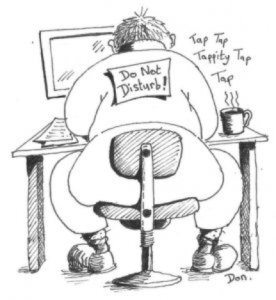Today I’m pleased to introduce you to a fascinating author, Tyler Wandschneider, whose new book – Lockheed Elite – releases today. It’s on my To Be Read/Reviewed list, but you know I’m a bit slow on getting through my backlog of reviews lately, so the review will take a while to post. But I didn’t want you to have to wait to learn about the book or the author, so without further ado I give you an interview AND bonus guest post on writing a book. Enjoy!
Where did your idea for Lockheed Elite come from?
(Smile.) I love the idea of life in space. When I picture it, I see life there as common as it is planet-side. Making a living in space would consist of many of the same things, just without the ground. All I had to do then was think about what kind of work should this crew do. What could give them the opportunity to get in the most trouble. Then I began exploring it and had a blast doing so. I felt that an experienced independent crew that ran on their own clock would give us the best crew to start with. The next step in that was to put them through a wringer.
When did you start writing Lockheed Elite?
In the summer of 2015. It began as a kind of episodic project. At first I envisioned long chapters that were a kind of short story in and of themselves; as if they were their own “episode” in a television series. Soon after I was asked to submit a sample of it for consideration on a serialized literature website. I did. And they accepted. And then the story took on more of a novel feel to the story.
It sounds like Lockheed Elite was previously published then.
Yes, it was. Well, in first draft form anyway. I published Lockheed Elite a chapter a month as I wrote it. I worked with Therin Knite at Knite and Day Publishing. I’d write a chapter, Therin would perform a copy edit on it, then I’d revise and post it on Channillo.com. This went on for a little over a year and it created some great buzz on Channillo.
How did you get from publishing Lockheed Elite on the internet to releasing it in book form?
It was always the plan to publish in book form. I just didn’t expect to go online first. But I’m glad I did. I discovered some of my first fans there and their praise for the story helped encourage me all the way to the end. After I posted the last chapter on Channillo, in many ways, the work had just begun. I think I must have read through the book at least 2 or 3 more times, adjusting this, removing that, and adding a bit here and there. Then I pulled together some friends who love to read and asked them to read it and provide comments. Graciously they did and then I went to work again after they were finished. I went through the book a couple more times and then handed it off to Vicki Adang at Mark My Words Editorial services for a professional proofread. After I received her edits, I went through the book a couple more times and then it was time to publish.
Is Lockheed Elite, the novel, Traditionally or Self-Published?
My goal is to work my way into traditional publishing but this book isn’t the one to do that. The story and the writing are certainly good enough to find a publisher but my decision to self-publish is two-fold. There’s an issue of timing and then there’s the fact that Lockheed Elite has technically been published already. As an already-published book (online), a brick-and-mortar publisher would have to release it as a “reprint”. It would be very hard for me to find a publisher willing to do this in an already hyper-competitive field, especially since this is only my second novel. So, I’m going to put it out there myself and take the time I would have been spending writing queries and instead put that into promoting the book and writing the next one. I have about 60,000 words of outlining finished for it so I’m deliciously excited to get going on it.
Who’s going to enjoy Lockheed Elite?
Whether on the big screen or in a binding, I love science fiction stories. Truthfully, I love all kinds of stories. But my favourites are about how a band of men and women get into trouble and then strive for survival. When a story is mysterious enough to keep the hidden plot as such but entertain and inform along the way, it’s a delicious treat that satisfies an aching in us that we knew was there but were never able to define. And I love a good heist. So I wrote Lockheed Elite for me and anyone like me.
And for those who will enjoy Lockheed Elite, where can they find it?
All the normal places like Amazon.com, BarnesandNoble.com, and more… And for those who like to shop Indie shops, find one near you here.
Okay, Tyler, I read a recent blog post of yours and had a thought. How about we cut the interview a bit short and end with how you answered the question, What Does it Take to Write a Book? How does that sound?
I think that sounds great. It’s been an honor being a part of your blog, a very big thank you to you and your readers. I hope you’ve all enjoyed our time together. So, without further delay and no more ado…
The Guest Post: What Does it Take to Write a Book?
To answer this, we have to start at the beginning. A lot of writers and writers-to-be jump right to the same thought, I want to write a book. But they wrongly stop there. That statement needs to be turned into a proper question.
Why…do I want to write a book?
There are a lot of books out there written for the wrong reasons and it shows in the writing. What’s worse, I fear, is the authors of those books are totally blind to this because they see a sort of mirage at the end. After reading this, I might be called a purist or something close and that’s okay because, at the end of the day, stories deserve a telling motivated by things far more noble than things of the personal gain kind. I would even submit to you the correct motivations are on a level so simple it might surprise you. So let us get into it, shall we…
What does it take to write a book? That’s the question we’re investigating and I think the best way to describe what it takes to write a book is to eliminate the things that are not good reasons to take that journey. There are many, but in the interest of long-form brevity, I’ll share with you the two biggest misconceptions about writing a book. You might call them myths actually, but they’re really false motivators that aren’t the right reasons why a book should be written. At least not from my perspective. By removing these two factors from the equation, we might better highlight the thing that drives a good book to come to fruition. This is important because we all love a good story telling. It’s why we’re reading (or writing) this particular article. What does it take to write a book? Part of what it takes is knowing the answer to ‘Why do I want to write a book?’.
 To make money. It’s a good investment, right?
To make money. It’s a good investment, right?
Good question, dear reader. So let us talk money, then. Cha-ching! Best reason to write a book, right? Wrong. In a monumental way, and here’s why.
Let’s say you set out to write a book in the hopes of cashing a retire-early paycheck. Or even a modest one to help pay off that credit card debt. Here’s your first lesson; it’s years before you see a dime in return; if you see a dime at all. And a dime ain’t squat so don’t waste your time if money is on your mind. Because if you’re going to write a book to make money, you have to realize that you’ve now turned this thing into an investment. And not a very good one considering the ratio of good to bad books out there, not to mention the sheer competition. It’s not a good investment because you’ll spend at least $3-6K on editing and cover design alone to get the book print/ebook ready. You just have to. Are you going to spend that kind of money with a slim chance of breaking even? No, no one would.
At this point, you ask, “But Tyler, what if I get a publisher?” Well, ducky for you, I say. You still will have paid editors to make your manuscript shine for a publisher to say yes so you’re still footin’ a bill. Note: The bill is well worth it if you find the right editors. And also, debut authors might not even get an advance from the publisher and if they do, it probably won’t even cover the editing costs. So before you sell one copy you’re thousands of dollars in the hole with all that money riding on your first attempt at a novel. Good luck, dear rebel, good luck.
Furthermore, if you set out to write a book to make money you’re most likely going to have to write something that sells not something you’re passionate about. In the end, the book will be lacking something very important; your own love for that story. If it’s missing, people can tell and the book will feel flat. Again, not good for the “investment”.
Moreso, if you set out to write a book that sells, you can’t know what will be selling in 2-3 years so you’re stuck with writing what’s selling now. Guess what? That will have changed by the time the book is ready. Now you’re late to the party and you’re wearing the dress that Sally already wowed everyone with last week. Tsk tsk, dear money-seeker, tsk tsk.
 Can I become famous?
Can I become famous?
Okay so if not for money, then what? Fame? Muah hahaha….I laugh at your folly! Here’s the little nugget of truth on that one. IF (note the big if there), IF you find a modicum of notoriety, no one will know who you are for a very long time. I’m talking years AFTER the years you spend writing the book. So to that, I say this. If you’re fueled by the desire to be famous and writing is the avenue to which you toil, then you must ponder on something before writing that first word. Imagine doing a very difficult favor for someone over and over again. Do that favor for several years without ever being thanked or appreciated for your effort. If you’re the fame seeking type, then 99 times out of 100, you’ll stop doing that favor because it’s not giving you what you seek. You’re not getting the recognition you longed for quick enough so, ultimately, you will give up. I promise. So it is with writing. If you write a book in the interest of fame, the story will suffer, your motivation will fade, and you won’t get what you wanted.
So, you can’t do it for the money and you can’t do it for the fame. What is it then? What does it take to write a book?
Might I submit to you that it is a simple two part answer? The first being a sort of aching that takes residents in your mind. To put words to that aching, they would sound something like… “There’s a story brewing in my head and I have to get it out, or it will drive me crazy.” The purest motivation for writing a book is as simple as the desire to tell the story that’s been building in your mind. As soon as I started thinking about Pandora’s Chase, I couldn’t stop trying to get it out. It was the same with Lockheed Elite and I suspect it will continue with The Rift in Saela. (It already has…)
It’s an itch you see. And it must be scratched. A writer without a pen or keyboard is still a storyteller at heart. We go to the store, and we’re still plotting. We go to work, and we’re still pondering the ending. We have something to say and so we must say it. And there is the first part of what it takes to write a book. The proper inner motivation to simply tell a story. Our mind paints for us the story in its entirety at the very inception of the tale. We feel what we want it to feel like for you. And that drives us to write it. It’s not money or fame. It can’t be. Stories deserve a better telling.
Now that we have the correct motivation for telling a story, the easy part is done. Now we have to write the book and herein lay the other part; what it physically takes to write a book. When I set out to write Pandora’s Chase (my first book), I knew the story, I knew what I wanted it to be. But I didn’t know how long (how many words) the story in my head was. So I did what every new novelist does. I googled how long a sci-fi novel should be. My research turned up an average of about 125,000 words. But then I discovered an interesting tidbit of info; authors should keep their debut novel word count to about 100k. My first draft of Pandora’s Chase was 135,000 words. oops. My editor made me cut 35,000 words. I did. And the story fell apart.
Anyway, lets put this into perspective, shall we? Tomorrow morning, sit down and write 5,000 words of a story and write them as well as you can. To save you the suspense I can tell you it will take you all day for various reasons but the lesson to learn is this: it takes time to write well. Pandora’s Chase took me something like 4 years to write and complete for publication. Lockheed Elite took me about two years start to finish. The only difference between the two is that I was more disciplined in writing on a more regular basis. Plus, I really like Lockheed Elite. It was extremely fun to write it so it was easy to find the time. Plus I was learning a ton about writing while writing it.
“So what does it take, Tyler?” I hear your longing to keep me on track here. Sorry, it’s hard to not follow little rabbit trails. Which is another good point here. Writing start to finish on a 100,000-word book can be like that (following rabbit trails). Write for awhile revise, rewrite, revise rewrite then move on to the next 5,000 words. You will constantly follow an idea and then change what you said, go back and review, and when you do finally gain some traction and lay down 10 or even 15K words, you’ll realize you need to drop in some red herrings or a gun on the mantle some while back. Then all of a sudden you’re spending a month or two on your previous 25,000 words. It’s a constant back and forth, two steps ahead four steps back, process that requires patience, discipline and above all a desire, neigh, a passion for telling that story. Not to mention the sacrifice your loved ones give for the time away from them. (If you write, don’t forget to thank them every chance you get for giving you the freedom to let your mind take these wonderful trips.)
The aforementioned above doesn’t even account for the various times you’ll rewrite the beginning 25,000 words. Or the ending to get it just right. And yes….the middle too. The crux of it all is this: if you finish writing a 100,000-word novel, most likely, you will have written close to 200,000 words!!! Honestly, I could be way off too. I wouldn’t be surprised if it’s closer to 300k if you counted all the times you’ve hit that backspace key.
So do the math. If it takes all day (8hrs) to write 5,000 words that still need to be professionally edited, then 200,000 words will take you 320 hours. That’s 40 days of 8 hours a day. Now weave that into your everyday life. You have work, a spouse, a boyfriend, a girlfriend, a paramour (sinner), kids, hobbies, house chores, errands to run and much more. At best you can spare an hour or two a day and if you give that to writing…dear friend, THAT is a serious commitment.
If you go through that gauntlet for anything other than a desire to tell that story, you’ll run out of fuel. Money and fame can motivate for only so long without remittance due because they are an empty hope. It has to be for the story. Everything you do on that story has to serve that story.
 Can you see it now?
Can you see it now?
Writing a book has to be for other reasons than money and fame. A passion for telling a story and the discipline to sit down and write it. If for nothing else, that piece of art deserves a better reason to be created. My decision to not publish Pandora’s Chase had nothing to do with telling a story. I finished it. The story was told, the piece was done and it was, and still is, a piece of art. It was written from that desire to tell a story. Nothing more.
So what’s this letter about? It’s about discovering whether you have what it takes to write a story, short or novel length. Do you have a story in your head that needs to get out? Do you feel that itch but just haven’t scratched it yet? Then you very well might have what it takes to tell a story and who cares how long it takes.
So let’s have it, dear writer. I dare you. If you’ve never written a story before, sit down and commit to doing two exact things.
Start telling the story…
…and keep going until the story ends.
Because if you write more beginnings than endings, then your endings will never be as good as your beginnings.
Thanks for listening, I hope I’ve shared something worth your time,
PS – Always remember that there’s no greater honor you can bestow an author than to tell a friend of them. Reviews help too. Newsletter signups, yup, you betcha. But that telling a friend thing is better because we get to talk to our friends then. ☺
See ya ‘round the corner.


 Jill-Elizabeth LinkedIn
Jill-Elizabeth LinkedIn





[…] few weeks ago, I introduced you to Tyler Wandschneider, author of Lockheed Elite, the first in a new sci fi series about a team of […]